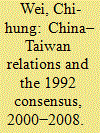| Srl | Item |
| 1 |
ID:
146166


|
|
|
|
|
| Summary/Abstract |
After mid-2000, Beijing inclusively redefined ‘one China’ as ‘both the mainland and Taiwan belonged to one China’. It also advocated the ‘peaceful development’ of China–Taiwan relations. Why did China moderate its Taiwan policy? I argue that the ‘1992 consensus’—a term invented and promoted by pan-Kuomintang (KMT) actors to describe the spirit of cross-Strait détente during 1992–1995—constituted China's policy moderation. Pan-KMT actors persuaded Beijing that its coercive approaches had alienated the Taiwanese people and that a conciliatory approach might win their hearts and minds. Accepted by Beijing, the 1992 consensus constructed China's Taiwan policy after 2000. Although Beijing has somewhat deemphasized the 1992 consensus since 2012, the term has established a legacy of appropriateness that Beijing is unlikely to undo in the short-to-medium term. In comparison with the Taiwanese case, no Hong Kong actors have played a role in persuading Beijing to keep its ‘one country, two systems’ promise.
|
|
|
|
|
|
|
|
|
|
|
|
|
|
|
|
| 2 |
ID:
148292


|
|
|
|
|
| Summary/Abstract |
Dominant discourses of immigrant value in Taiwan and across Asia distinguish marital immigrants from desirable professional immigrants who are assumed to contribute their talents and economic productivity to their new home. This article examines national anxieties about the compromised value of marital immigrants and it illustrates the strategies adopted by immigrant spouses as they carve out new means of producing value through productive and reproductive labors. Focusing on mainland Chinese spouses in Taiwan, the article argues that contested political relations between Taiwan and China foster immigration policies that construct Chinese marital immigrants as familial dependents whose material desires and suspect political commitments are held in check by their identification with reproductive and care labors. The article asks how this complex devaluation system affects the life strategies of comparatively elite marital immigrants, Chinese women and men with postsecondary degrees and former professional careers in China. The article analyzes how these immigrants maneuver around policies that restrict their access to skilled employment, yet without necessarily rejecting their reproductive contributions to Taiwanese society. Elite spouses experience new forms of precariousness produced by the intersection of intimate life decisions with heteronormative gender roles, aspirations for self-fulfillment, and the insecurities of immigrant status.
|
|
|
|
|
|
|
|
|
|
|
|
|
|
|
|
| 3 |
ID:
178113


|
|
|
|
|
| Summary/Abstract |
The notion of strategic ambiguity has long guided the United States’ engagement in cross-strait relations, requiring that Washington is intentionally unclear about whether and how it would intervene in a China–Taiwan conflict in order to preserve a balance of assurance and deterrence for both sides. This article unpacks the US approach to strategic ambiguity under Trump. Adopting a neo-classical realist perspective, it argues that domestic and individual level drivers—in particular, US populism, Congress and the foreign policy establishment, and Trump's transactional and personalized approach to foreign policy—have interacted with the shifting US–China balance of power to produce a different mode of American strategic ambiguity in the Taiwan Strait. A common view is that as a function of the growing US–China power competition, the US has largely leaned towards Taiwan in recent years. Our analysis revises this assessment by revealing a form of strategic ambiguity under Trump that, despite appearing to upset the balance of ambiguity in favour of Taiwan—paradoxically and probably unintentionally—maintains assurances and warnings for both China and Taiwan. Yet, while Trump has arguably preserved the overall balance of strategic ambiguity, he has introduced greater volatility into cross-strait relations.
|
|
|
|
|
|
|
|
|
|
|
|
|
|
|
|